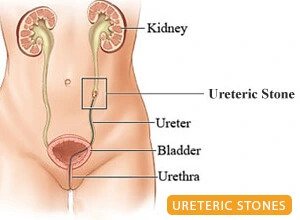Ureteric stones, also known as kidney or urinary stones, form when minerals in the urine crystalize and accumulate in the ureter—the tube that carries urine from the kidneys to the bladder. When a stone gets lodged in the ureter, it can cause intense pain and disrupt the flow of urine, leading to various complications if not treated promptly. In cases like these, finding effective and accessible Ureteric Stone Treatment in Ghaziabad becomes crucial for relief and recovery. Fortunately, modern urology offers several advanced and minimally invasive options for treating ureteric stones, ensuring patient comfort and high success rates.
Understanding Ureteric Stones: Causes and Symptoms
Ureteric stones form for several reasons, including dehydration, high sodium or oxalate intake, and underlying health conditions like obesity, diabetes, or metabolic disorders. Symptoms of ureteric stones can vary in intensity but commonly include:
- Severe, sharp pain in the lower abdomen or back
- Blood in the urine
- Nausea and vomiting
- Frequent or painful urination
- Fever and chills (if an infection is present)
These symptoms are often the first indicators that a ureteric stone may be present, and immediate medical attention is recommended to assess the situation.
Diagnosis of Ureteric Stones
Accurate diagnosis is essential for determining the most effective Ureteric Stone Treatment in Ghaziabad. Diagnostic methods commonly used include:
- Ultrasound: A non-invasive procedure that helps locate stones and assess their size.
- CT Scan: Provides a detailed view of the urinary tract and is highly accurate in locating ureteric stones.
- X-ray (KUB): Often used to detect larger stones and evaluate their position.
- Urinalysis: Checks for blood, crystals, or infection in the urine, indicating stone presence.
Advanced Ureteric Stone Treatment Options
With advancements in urological procedures, there are now various effective treatments for ureteric stones, depending on the size, location, and composition of the stone. Ureteric Stone Treatment in Ghaziabad offers these leading-edge procedures:
- Medication Therapy
For smaller stones, medications like alpha-blockers may be prescribed to relax the muscles of the ureter, allowing the stone to pass naturally. Pain relievers and anti-nausea medications can also alleviate discomfort during this process. Additionally, lifestyle modifications, including increased water intake, can support the stone’s passage. - Extracorporeal Shock Wave Lithotripsy (ESWL)
ESWL is a non-invasive procedure that uses shock waves to break down stones into smaller fragments, making them easier to pass. It is highly effective for small- to medium-sized stones and has minimal recovery time. Patients are typically able to go home the same day and can resume normal activities shortly after the procedure. - Ureteroscopy
Ureteroscopy is a minimally invasive procedure where a thin, flexible tube (ureteroscope) is inserted through the urethra and bladder to access the ureter. The surgeon locates the stone and can either remove it directly or break it into smaller pieces using a laser. Ureteroscopy is highly effective for stones located closer to the bladder and offers a swift recovery. - Percutaneous Nephrolithotomy (PCNL)
For larger stones that cannot be removed with ESWL or ureteroscopy, PCNL is often the preferred option. This procedure involves creating a small incision in the back to access the kidney directly, where the stone can be fragmented and extracted. While PCNL is more invasive, it is highly effective for large stones and is typically performed when other treatments are less suitable. - Laser Lithotripsy
Laser lithotripsy is a popular option for treating ureteric stones. A laser fiber is used to break down the stone, and the fragments are then passed out of the body naturally or removed during the procedure. This method is precise, reducing the risk of damage to surrounding tissue and minimizing recovery time.
Recovery and Post-treatment Care
Following Ureteric Stone Treatment in Ghaziabad, patients are advised to:
- Drink plenty of fluids to flush out any residual stone fragments
- Follow a prescribed diet to reduce the risk of future stone formation
- Attend follow-up appointments to monitor for any complications or recurrence
- Avoid strenuous activities initially, especially after procedures like PCNL
Preventing future stones is an essential part of post-treatment care. Regular hydration, a balanced diet, and periodic check-ups with a urologist can help reduce the chances of recurrence.
Why Choose Ureteric Stone Treatment in Ghaziabad?
Ghaziabad offers a range of advanced facilities and experienced urologists specializing in ureteric stone treatment. With access to state-of-the-art diagnostic tools and minimally invasive procedures, patients receive timely and comprehensive care. Choosing Ureteric Stone Treatment in Ghaziabad ensures that you’re in the hands of highly skilled professionals who are dedicated to providing personalized treatment options, focusing on quick relief and a return to a pain-free life.
Conclusion
Living with the pain and discomfort of ureteric stones is unnecessary when advanced and effective treatment options are available. From non-invasive ESWL to precise laser lithotripsy, Ureteric Stone Treatment in Ghaziabad offers a variety of solutions tailored to meet each patient’s needs. If you or a loved one is experiencing symptoms of ureteric stones, consult with a urology specialist in Ghaziabad today. Through prompt intervention and expert care, you can reclaim comfort, health, and peace of mind.
To learn more about Urology visit draggarwalsurology.com or also follow us on LinkedIn


